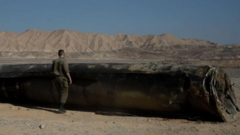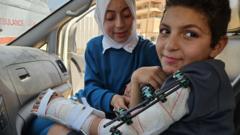The Israeli military reported the identification of Mohammed Sinwar's body, the military leader of Hamas in Gaza, following an air strike on May 13. His remains were found in a tunnel beneath the European Hospital in Khan Younis, alongside another Hamas commander. This revelation raises further concerns about the escalating conflict and the implications on civilian infrastructure in Gaza.
Identification of Hamas Leader Sinwar's Body by Israeli Forces

Identification of Hamas Leader Sinwar's Body by Israeli Forces
The Israeli Defense Forces announce the identification of Mohammed Sinwar, Hamas's military leader in Gaza, discovered in a tunnel after air strikes.
The Israeli Defense Forces (IDF) have confirmed the identification of the body of Mohammed Sinwar, the military head of the Palestinian group Hamas in Gaza. The announcement came after his remains were discovered in a tunnel located beneath the European Hospital in the city of Khan Younis. The IDF stated that DNA tests were conducted to verify the identity of the body, although Hamas has not officially recognized Sinwar's death.
Sinwar, 49 years old, was reportedly killed in an air strike that took place on May 13, which the Hamas-run civil defense claimed resulted in the deaths of 28 individuals with many others sustaining injuries. The IDF mentioned that along with Sinwar's body, the remains of Mohammad Sabaneh, the commander of Hamas's Rafah Brigade, were also recovered. Several personal items belonging to both Sinwar and Sabaneh were discovered, and intelligence findings have been submitted for further investigation.
The IDF took a selective group of foreign journalists to Khan Younis to showcase the tunnel where the bodies were found. Video footage displayed the narrow underground passage accessible through freshly excavated ground near the hospital's entrance. This tunnel contained various rooms, some of which were filled with discarded clothing and plastic chairs, along with a rifle positioned against a wall. A video also depicted a covered body being extracted from the tunnel.
IDF spokesperson Brigadier General Effie Defrin criticized Hamas, asserting that the organization exploits civilian infrastructure and uses hospitals as shields. This claim echoes accusations frequently made by Israel regarding Hamas's tactics; however, the group has consistently denied these assertions.
Israel's ongoing military efforts in Gaza have intensified since the unprecedented cross-border assault by Hamas on October 7, 2023, resulting in around 1,200 Israeli fatalities and 251 hostages. The health system within the Gaza Strip has been pushed to the brink of collapse due to bombardments on medical facilities, inciting widespread international alarm. Critics argue these attacks contravene international humanitarian law, which mandates protection for the wounded, medical personnel, and health facilities.
Following the failure of a ceasefire and a hostage exchange agreement, Israeli operations seek to dismantle Hamas's military capabilities while attempting to recover the approximately 54 hostages still held, with 23 believed to be alive. Sinwar was instrumental in Hamas's military strategy, having joined the organization shortly after its inception in the late 1980s and quickly ascending to significant leadership roles. His brother Yahya Sinwar, thought to orchestrate the October 7 attack, was killed by Israeli forces last October.
As events continue to unfold, the confirmation of Sinwar's death may influence the course of the ongoing conflict and the humanitarian impacts on the civilian populace of Gaza.





















